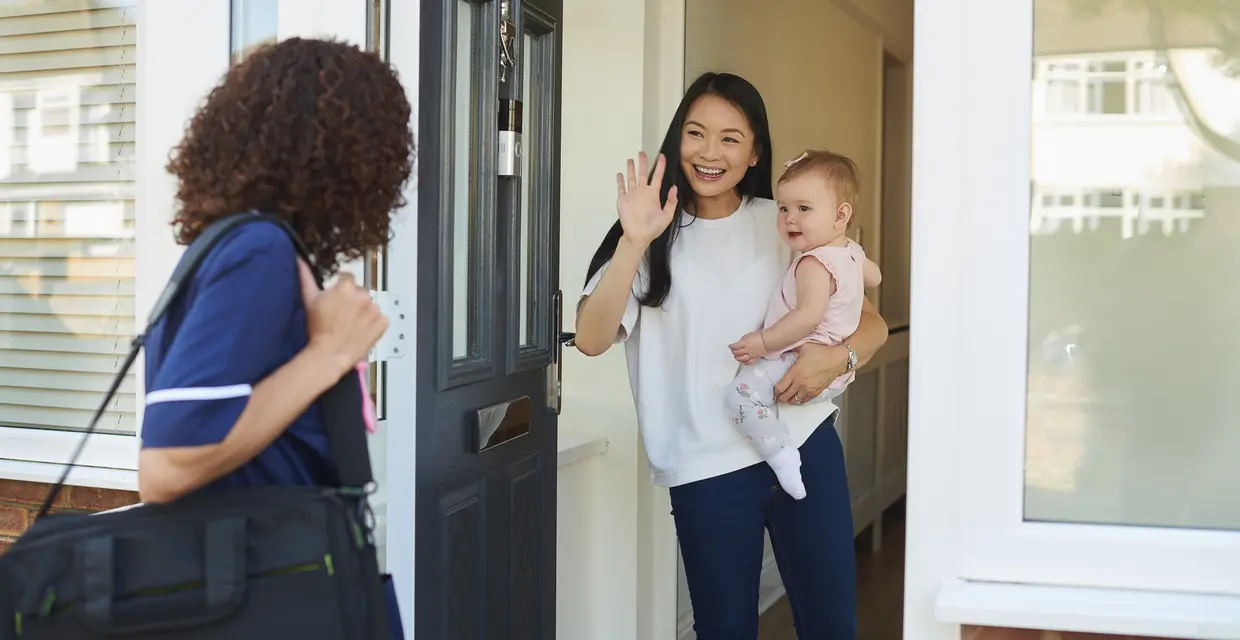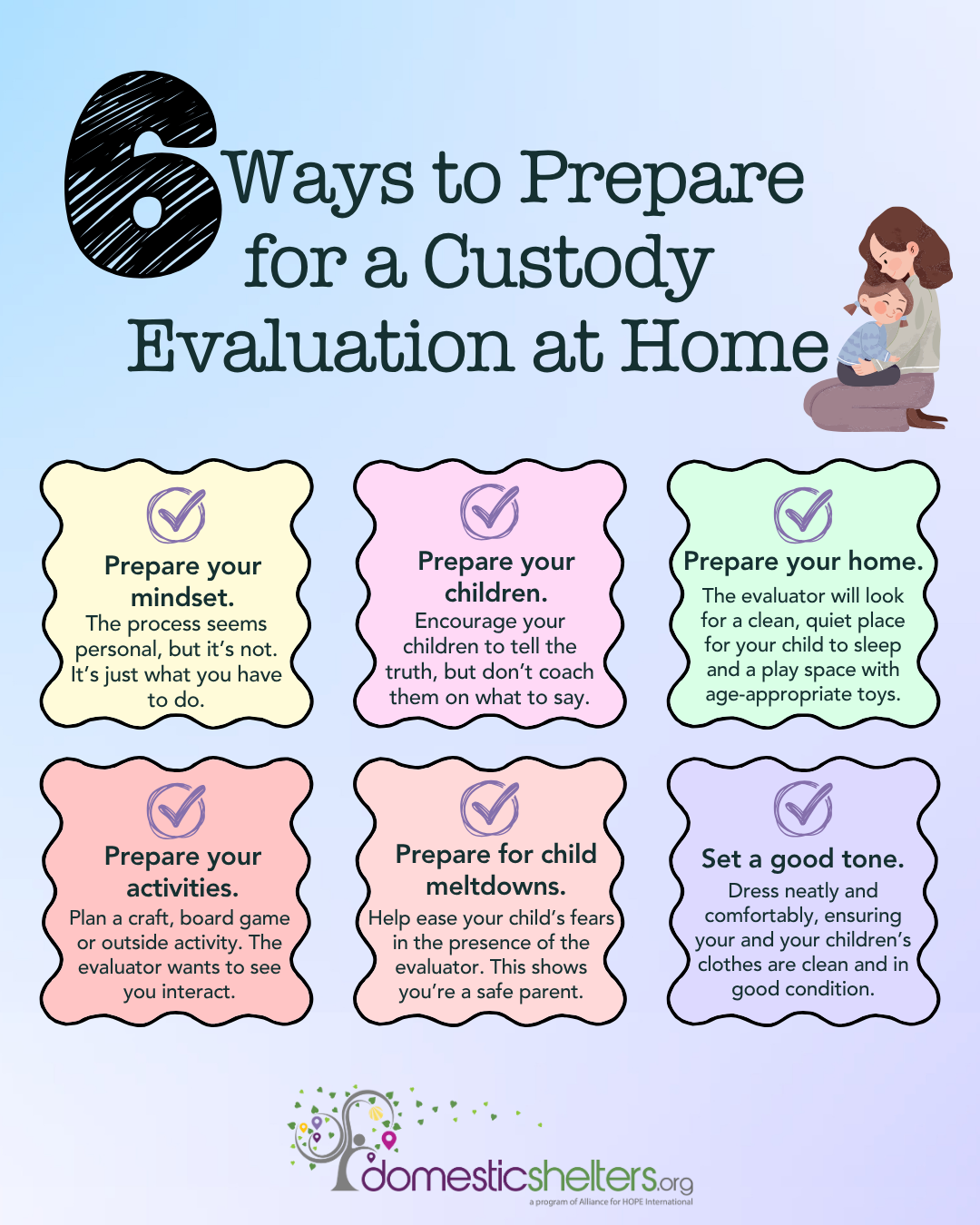1. Select a discrete app icon.

notes
Parenting Under Scrutiny: Navigating Custody Observations After Domestic Violence
Practical ways to stay calm, centered, and confident when a child custody evaluator is watching — and your past abuse still impacts the process
- Nov 09, 2025

Key Takeaways:
1. Preparation matters: A calm mindset, tidy home and planned activities help the custody evaluation go smoothly.
2. Show steady parenting: Stay patient, supportive and empathic — even if your child misbehaves or seems anxious.
3. Focus on connection, not perfection: Evaluators want to see love, stability and genuine interaction, not performance.
If two parents cannot settle on a custody plan, they may be faced with a court-ordered custody evaluation. This process helps the judge determine how to apportion parenting time and decision-making. Custody evaluations typically involve a review of case evidence, interviews and parent-child observations. Evaluators sometimes conduct the observations in their office, but more often, will go to each parent’s home.
Home visits can be unsettling and anxiety-provoking for survivors of domestic violence, specifically. You may feel like it’s unfair that you and your parenting are under scrutiny. Maybe you have always been the primary parent and decision-maker for your children. It may seem unjust that a stranger gets to make a recommendation.
You may not like the evaluator coming into your home and asking a bunch of questions. It’s intrusive. You may feel like you have to put on a performance. It may feel abnormal, uncomfortable and unjust. This can feel especially unfair if the other parent wasn’t interested in spending time with the kids before you separated.
These feelings make total sense, given the circumstances. However, a home visit can also be positive in the sense that it can show the primary, or protective, parent’s strong relationship with the children. And, fortunately, you can take steps to calm your nerves and make the observations successful. It’s all in the preparation.

Custody Observation Preparation: Your Mindset
Your mindset plays a critical role in moving through the custody evaluation and home visit. Accept that home visits are part of the process. The process seems personal, but it’s not. It’s just what you have to do. Think of it like bad weather. Not your first choice, but sometimes you must go out in the driving rain. Acceptance will allow you to show up as your true self: a kind, loving, and empathic caregiver.
Custody Observation Preparation: Preparing Your Children
Children who have been in a home with domestic violence often experience worries alongside their survivor-parent. Explain to your children that the evaluator may want to speak with them alone. They should just tell the truth about their experiences and speak from the heart. Reassure your children that they will be okay, but don’t coach your children on what to say.
What you say to your child about the planned observation will depend on the child’s age. You can say something like, “So-and-so is coming over for a couple of hours to see what our home is like. They’ll watch us spend time together. Then, they’re going to talk to the judge about what’s best for you.”
Custody Observation Preparation: Your Home
The custody evaluator will look around your home to make sure it’s a safe, clean and suitable place for children. Your home should be reasonably tidy, but doesn’t have to be spotless. The evaluator will look for a clean and quiet place for your children to sleep and a place to play with age-appropriate toys. Some evaluators will look into your refrigerator and cabinets to check for healthy food.
Custody Observation Preparation: Your Activities
Custody evaluations typically include only one or two visits in the home of each parent. Plan something to do so you and your children won’t just be sitting around staring at each other. Occupy the time with crafts, baking, card games, a board game or an outside activity like a family game of soccer or frisbee.
Don’t simply watch TV or play video games. The evaluator wants to see you interact. Have a couple of backup activities in case an activity runs short, or the home visit runs long, or in case one of your children refuses to do whatever you had planned. Healthy snacks and calming activities will ensure your children are at their best.
Custody Observation Preparation: Child Meltdowns and Misbehavior
Some abusers will prime children to misbehave or say certain things to the evaluator. Try to anticipate and prepare for this. If your child misbehaves or otherwise appears dysregulated, remember that this is your time to show your capacity for sound parenting.
Redirect and validate your child’s feelings: “I can see you’re upset right now. Would you like to take a walk?” “I believe you.” “I know this can be stressful.” “Can you tell me what you’re feeling?” Give your child a hug if your child likes hugs. Show love and care. Help ease your child’s fears in the presence of the evaluator. This demonstrates that you’re a safe parent and that your children will thrive long-term in your care.
Custody Observation Preparation: Setting a Good Tone
You’ll want to dress like a parent. A tee shirt and slacks or a dress are fine. Choose something that you usually wear at home and feel comfortable wearing. Make sure your clothes and the children’s clothes aren’t stained or torn.
Avoid sarcasm, jokes or commentary that could be misunderstood or misquoted. For instance, don’t make a joke about your below-average cooking skills. Consider making a positive comment about the other parent, as challenging as this may be. This could be a comment that, “You’re a great griller like your dad” or, “You’re athletic like your mom.” In doing so, the evaluator will see your empathy, stability and willingness to place the needs of your children first.
Virtual Custody Observations
Some custody evaluators conduct parent-child observations through video chat. When this happens, the custody evaluator observes you through your phone or computer camera. You’re expected to “act natural” in a situation that is highly unnatural! You may have to move your device from room to room as you move around with your children. At the same time, it may be difficult for the evaluator to see and hear what’s going on.
Donate and change a life
Your support gives hope and help to victims of domestic violence every day.
If a virtual observation is what the evaluator requests, you may not have a choice. Try to plan activities so you don’t need to move the device around too much. For instance, play a board game at the dinner table and then eat dinner with your children, with the evaluator watching. Turn off background music or television so the evaluator can hear.
Custody Observations in the Evaluator’s Office
Some evaluators schedule observations in their offices. They might give you a task to engage in together, like “build a tower with these blocks” or “draw a big picture of your family.” Try to allow your children to do their part without intervening too much. Remember, accomplishing the task is not what matters most. Rather, the goal is to show how supportive and encouraging you are.
Involve yourself in the project, but don’t take over. Try to have fun and don’t criticize your children or expect too much from them. If the evaluator makes comments or issues instructions, receive them openly. Avoid getting defensive.
Bring some toys, homework, games and food to the office in case the evaluator wants to meet with you alone for a time. Ask the evaluator’s permission before taking out the food.
In short, planning a few activities, anticipating and planning for misbehavior, having ample water and snacks available, and appearing positive, stable, caring and empathic will ensure the observation goes as smoothly as possible.
Try your best to act natural and avoid stressing out. You cannot control the entire process. And as in all things related to being a parent, you do the best you can.
Always make sure to answer any questions about the other parent honestly but don’t go out of your way to be critical. It’s important to strike a balance between painting an accurate picture and demonstrating that you can stay focused on your child’s best interests rather than personal grievances.







